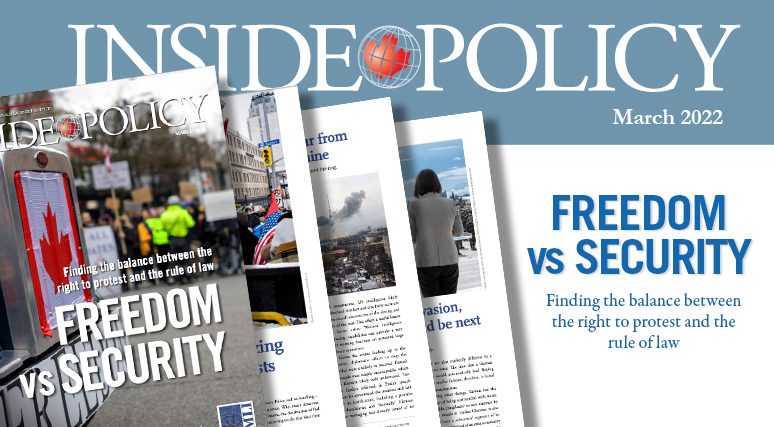The Freedom Convoy protests that took place in Ottawa, and had spread to border crossings in Coutts, Alberta and Windsor, Ontario, brought to the forefront questions about the balance between safeguarding the right to protest and maintaining the rule of law. The federal government’s use of the Emergencies Act to remove the convoy’s occupation in Ottawa has proven especially controversial.
To lead our cover feature, Ryan Alford explores the dangers of politicizing the policing of protests. As he reminds us, we need to tolerate groups of law-abiding protesters, while acknowledging that the rule of law also requires that individuals who violate the Criminal Code be held accountable. In addition, Ken Coates looks at the Freedom Convoy’s long-term consequences to the nation’s future and Stuart Parker examines the curious case of the NDP’s historic decision to support the federal government’s use of the Emergencies Act.
Also in this issue, Coates questions the federal government’s approach to innovation policy, Melissa Mbarki raises concerns about the impact of COVID on Indigenous communities, and Chris Sankey highlights the destructive role of eco-colonialists on Indigenous reconciliation and our natural resource economy.
We are also delighted to feature high school student Meghrig Milkon’s winning essay from MLI’s Speak for Ourselves Essay Competition, in which she offers a moving account of her experience immigrating to Canada from Syria.
Meanwhile, the federal government also faces a number of international challenges. Richard Shimooka offers a useful primer on some of the lessons that the West, including Canada, can learn from Russia’s invasion of Ukraine, while J. Michael Cole provides an insightful look at what this invasion means for Taiwan.
Lastly, Heather Exner-Pirot warns about the global energy crisis and how Canadian policies have only exacerbated it, Kyle Matthews writes about China’s totalitarian use of technology, and Jeff Kucharski criticizes the government’s failure to review the purchase of Neo Lithium by a Chinese state-owned enterprise, especially in light of China’s desire for global high-tech dominance.






